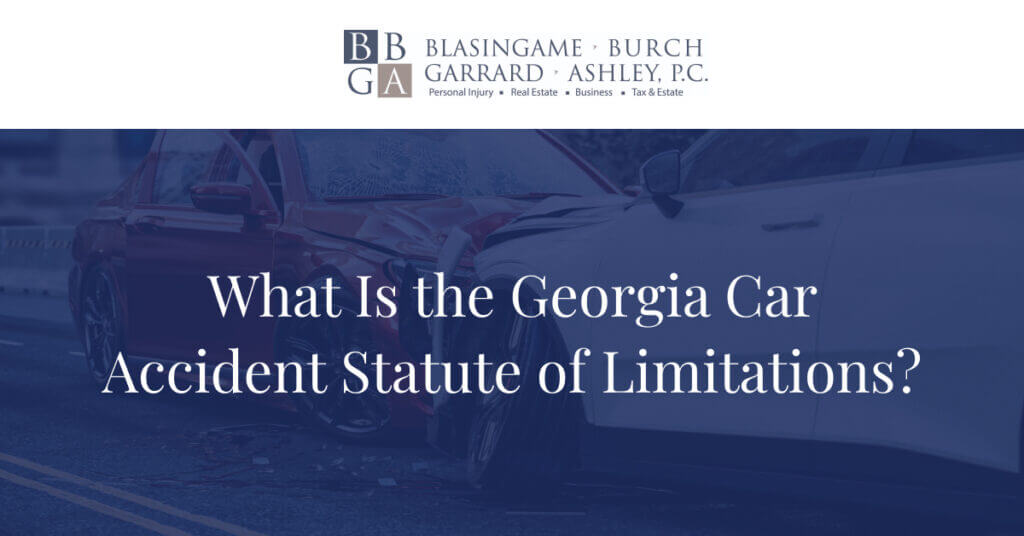
The Georgia Department of Transportation reports that in 2021, there were 387,444 car crashes.
Because of those wrecks, nearly 2,000 people lost their lives in a Georgia auto collision.
Over 490,000 suffered injuries because of the negligence of others in a car crash that wasn’t their fault.
Car crash survivors may recover compensation by filing a lawsuit against the at-fault parties. In most situations, crash victims must file a lawsuit within two years after the wreck. This deadline is called the Georgia auto accident statute of limitations. Exceptions may apply that shorten or lengthen the deadline.
The best way to protect your legal rights and help ensure you don’t miss the deadline is to talk to a Georgia car crash attorney. Our skilled legal team at Blasingame, Burch, Garrard & Ashley, P.C. provides outstanding representation to Georgia’s crash victims. Our Georgia auto accident lawyers can evaluate your claim and help you understand and meet your deadline.
Call (706) 354-4000 or reach us online today for a free consultation.
How Long Can You Sue After a Car Accident?
In Georgia, the statute of limitations for car accident claims is two years. This means that any lawsuit arising from a car accident in Georgia must be filed within two years of the date of the accident. Failing to file within this timeframe can result in the loss of your legal rights to pursue compensation for damages. It’s crucial to act promptly and seek legal advice if you’ve been involved in a car accident to ensure you comply with the statute of limitations and protect your rights.
Exceptions to the Georgia Car Accident Statute of Limitations
As a rule of thumb, plaintiffs must file a car crash lawsuit within two years after the collision. But the statute of limitations for a car accident in Georgia can be longer or shorter, depending on a few factors.
Plaintiff Is Legally Incompetent at the Time of the Crash
Let’s say that a crash victim is disabled or mentally incapacitated at the time of the crash. In that case, the crash victim gets the same amount of time that everyone else does after the disability or incapacitation ends. Put another way, the clock doesn’t start ticking until the date that they are no longer legally incompetent.
Plaintiff Is Under 18 Years of Age
Underage plaintiffs also get an extended deadline to file claims. They usually have two years after their eighteenth birthday in which to file a lawsuit.
Plaintiff Becomes Disabled After Crash
If the plaintiff is disabled from the crash, this pauses the Georgia car accident statute of limitations until the disability subsides. The disability may, but does not have to, relate to the auto collision. For example, a traumatic brain injury or other debilitating injuries may cause them to go into a coma. In this case, the statute of limitations will pause during the time that they are mentally incompetent to file the lawsuit.
Get a Free Case Review
Were you injured in a Georgia auto accident? Simply submit the short form below to speak with an experienced injury lawyer from BBGA about your case.
Fraud
Let’s say that the defendant fraudulently convinces the plaintiff not to bring a claim against them or another party. Fortunately, Georgia law pauses the statute of limitations during this time. The two-year clock starts ticking again once the plaintiff realizes that they were the victim of fraud.
Pending, Related Criminal Prosecution Underway
Crash victims may have up to six years to file the lawsuit in some situations. This exception applies if a crash-related criminal case, such as a DUI charge, is pending. Plaintiffs would then have six years from the date the criminal case ends to file a lawsuit.
Property Damage
Crash victims have up to four years after the accident in which to file a lawsuit to recover compensation for property damage only.
Actions Involving the State or County
If you’re filing a lawsuit against a county in Georgia, you typically have just one year from the date of the accident to file a claim. This shortened deadline also applies if you’re filing a claim against the state.
Actions Involving a City or Municipality
Before you can file a claim against a city or municipality, you must file a special notice within six months after the accident. In most cases, the two-year statute of limitations pauses while the claim is pending with the city.
Contact Us
How Long After an Accident Can You File a Claim?

Before you file a lawsuit in court, you need to report the wreck to the authorities and file an insurance claim.
Georgia law requires you to report the crash immediately after the accident occurs. If you don’t, you may be subject to penalties.
If a severe injury or other crash-related condition kept you from reporting the crash, then you can wait to report the accident until you are stable.
Don’t depend on this cushion, though. Report the accident as soon as possible to limit your potential liability.
After an accident, the victim typically files a claim with the at-fault party’s insurance company. While there may not be any strict deadlines, there are a few things to keep in mind.
First, you need to file a claim early on to give yourself more time to negotiate with the insurance company. Additionally, filing a claim with the insurance company doesn’t impact the statute of limitations for filing a lawsuit. File a claim in advance to allow yourself enough time to file a lawsuit within the deadline, if needed.
Contact an Experienced Georgia Auto Accident Lawyer
At Blasingame, Burch, Garrard & Ashley, P.C., we have spent 40 years curating a culture of unrivaled competency and courage.
Our team of skilled attorneys has years of experience helping car accident victims hold responsible parties accountable. We thoroughly understand Georgia car accident laws and routinely work with insurance companies, doctors, accident reconstructionists, and other experts to ensure our clients get the money they need to move on with their life.
We care about our clients and the communities we serve, supporting them in and out of the courtroom.
Call us at (706) 354-4000, or contact us online today for a free consultation.

